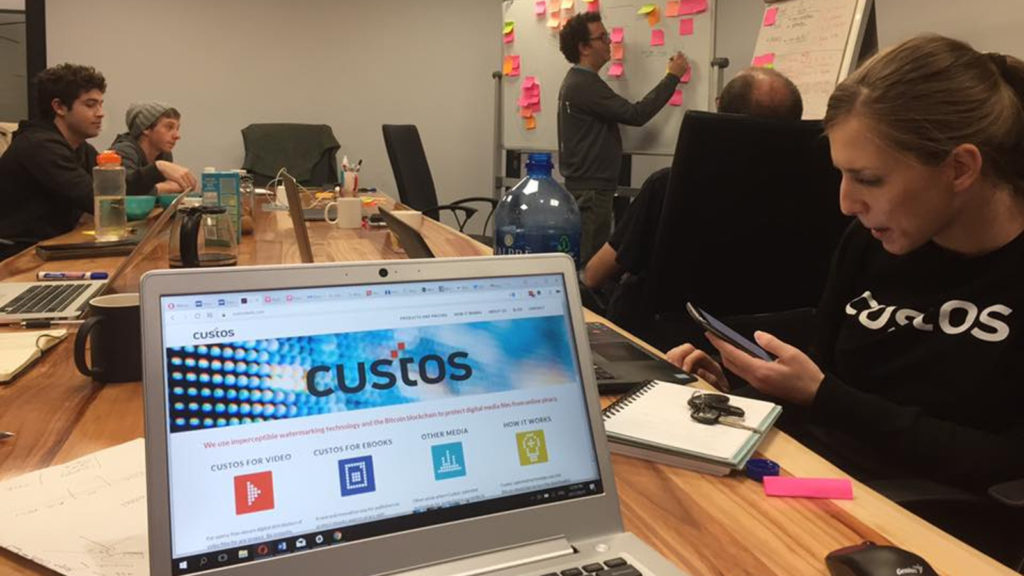LG’s 100-Inch QNED evo AI TV Redefines Big-Screen Viewing in South Africa In a bold leap forward for home entertainment, LG Electronics South Africa…
Looking to spin-out your IP from a public institution? Here’s how Custos did it

As any tech startup founder will tell you, raising funding from local venture capitalists is no easy feat. The task is made even harder for entrepreneurs who have developed intellectual property (IP) with the help of a university and now want to commercialise it.
In accordance with the Intellectual Property Rights from Publicly Financed Research and Development Act 2008, all IP generated at public institutions remains under the ownership of these public institutions themselves.
This makes it difficult for startups to take ownership of IP that they may have created with the help of a university.
Yet Custos Media Technologies recently did just that — and has become perhaps the first startup that has spun IP out of a publically funded university in South Africa, when it announced earlier this month that it had spun-out its IP from Stellenbosch University.
Now other spin-outs can hopefully point to us as an example when they get posed the question – Custos COO and co-founder Fred Lutz
While at Stellenbosch University’s MIH Media Lab, Custos COO and co-founder Fred Lutz and fellow co-founders G-J van Rooyen and Herman Engelbrecht developed an innovative way to embed blockchain code in digital media, in a bid to help curb piracy.
In 2014 the institution made history by becoming the first African university to file a patent for blockchain technology.
In all, the university’s tech transfer office Innovus spent about R900 000 registering, patenting and protecting Custos’s IP.
Business information platform Crunchbase estimates that Stellenbosch-based startup has raised over $800 000 since it launched four years ago. The funding has come from local institutional investors, a local angel investor and various US-based VC firms. No local VCs have participated.
“The risk appetite of the local VCs meant that they frequently saw the university ownership of the IP as too big a risk to invest in Custos,” says Lutz.
The startup therefore decided to spin out the IP from the university, to reduce this perceived risk from investors.
When we invented the @CustosTech technology at @StellenboschUni, investors told us that we’d never be able to get the IP out of the University and into the spin-out company.
In fact, moving the patents turned out to be a simple process under the IPR Act:https://t.co/F1svLnZvlY
— G-J van Rooyen (@gvrooyen) October 31, 2018
“Some investors have asked us over the years whether we own our IP, and did not believe us when we explained the relationship with the university and that we will be able to spin out the IP when needed. So we spun it out,” explains Lutz.
“Now other spin-outs can hopefully point to us as an example when they get posed the question,” he adds.
Lutz says from the beginning, the Custos founders understood that the licence and eventual transfer of IP would be exchanged for equity in Custos.
“The university has a streamlined process to simplify this process, with the terms — as was in our case — including an exchange of shares in lieu of a licensing fee, with the right of the university to revoke the licence if it was not utilised,” he says.
So how then did they do it?
IP for shares
Innovus CEO Anita Nel says the technology transfer office set up a parallel IP holding company and then mirrored the shareholding in both companies.
“We have also stapled the individual shareholders’ shares in both companies, so that you cannot sell shares in only one of the entities,” she says.
The IP holding company then licenses the operational company to exploit the IP commercially. In return, all IP generated in the operational company is automatically assigned to the IP holding entity.
It’s the first time Stellenbosch University has assigned a patent to a spin-out company, says Nel. Previously, the university has opted to license the patented IP to a spin-out companies.
“However, we assign the trademarks registered on behalf of the companies to the companies on a case-by-case basis. We have, however, initiated the process of assigning IP in a second case to one of our spin-out companies. We hope to conclude that process this year,” she says.
Dealing with Nipmo
Lutz says the first thing the startup had to do before spinning out the IP from the university, was to get permission from South Africa’s IP governing body — the National Intellectual Property Management Office (Nipmo)
Nipmo regulatory and compliance director Jetane Charsley says by March this year, publicly financed research and development institutions had granted 95 IP licenses (of which 78 were exclusive licenses) to entities. In all 45 of these licenses were granted to small businesses.
A technology transfer office in consultation with the entity seeking to commercialise the IP (such as a startup) can decide to provide access to the IP either via a licence or by selling off the IP through an assignment. These licenses may be granted non-exclusively or exclusively.
A non-exclusive licence allows the licensor (owner) to grant multiple licenses of the same IP to different licensees. An exclusive licence precludes the licensor granting the same rights to any third party (or from exploiting those rights itself) during the term of the exclusive licence.
Charsley says there are various payment types that can be negotiated in a licensing agreement. They include the option of fixing payments through a royalty fee, a once-off payment license or the inclusion of milestone payments.
After negotiations between the technology transfer office and the startup are concluded, the technology transfer office must submit an application to Nipmo for the approval of either a royalty-free IP transaction or an assignment of the IP.
Nipmo must then assess whether assigning the IP to the third party will be the public interest — that is whether the country would benefit or not, from selling off the IP.
No Nipmo approval is required for a royalty-bearing IP transaction — approval is only necessary when the IP is assigned (sold off) to the new party.
‘Don’t be afraid to approach tech transfer offices’
Charlsey advises startups that they should not be be afraid to approach an institution or technology transfer office if they note that they have IP which they may be interested in or that will work within their business.
She adds that a lot of institutions advertise their available IP on their websites and are “willing” to give instant access licenses. “Therefore, don’t forget to consult their websites regularly,” she advises.
Lastly, she urges startups to make use of the Department of Science and Technology’s Innovation Bridge portal which allows users to search for available technologies produced by organisations and individuals.
Read more: African universities increasingly working with ‘role players’ out of necessity [Q&A]
Read more: UCT tech transfer unit has developed 21 startups, 125 active technologies [Q&A]
Read more: Tertiary education one of founding blocks of entrepreneurship – MEST head [Q&A]
Read more: African universities not connected to ecosystem as they should be [Q&A]
Featured image: Custos Media Technologies via Facebook


